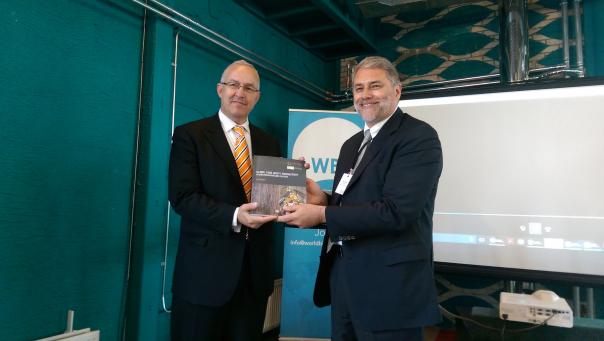
The report, titled ‘Global Food Waste Management: An Implementation Guide for Cities’, has been written by the World Biogas Association (WBA) in collaboration with the C40 Cities Food, Water & Waste Programme. It outlines:
- The experiences of cities around the world in managing their food waste
- The best practices for preventing and reducing food waste
- An overview of collection systems to ensure clean food waste is brought to treatment
- Treatment alternatives for inedible food waste, from composting to anaerobic digestion (AD)
- The use of outputs from the various treatment processes and how to best valorise them
- The policies needed to ensure food waste is sustainably managed
The report highlights the importance of separately collecting and treating inedible food waste, which, if implemented on a global level, would have the same impact for CO2 emissions reduction as taking all EU cars off the road.
David Newman, president of the WBA, said: “Treating inedible food waste represents an opportunity to cut emissions while resolving other issues around energy, soil quality, waste management and human health in urban areas. The technologies to resolve all these (particularly AD) are mature and deployable now, and the WBA can support cities in their transition. What are we waiting for?”
Most global cities do not collect food waste separately, instead leaving it to be disposed of in dumps, landfills or incinerators.
As a result, food waste is not treated and loses its potential to resolve the environmental issues faced by all cities.
The report also highlights the role of biogas technologies, which through AD recycle inedible food waste into renewable heat and power, clean transport fuel, and nutrient-rich biofertiliser.
AD technologies that are mature, ready-to-implement, and cost-effective, allow maximum recovery of resources for both green energy generation and soil restoration.
Brian Guzzone, director of waste and climate projects at the Eastern Research Group, who contributed to the report, added: “Today’s cities face pressures from a growing population and rising consumerism that strain infrastructure for managing municipal solid waste.
"The organic material in these waste streams represents a tremendous opportunity for cities to achieve sustainable waste management, and the best practices gained from this report can help put them on the road to a low-carbon future.”
Urban food waste management will be a key topic at UK AD & World Biogas Expo 2018, taking place on the July 11 to 12 at the NEC in Birmingham. It is being co-organised by the WBA and the UK Anaerobic Digestion and Bioresources Association.
The full WBA report can be downloaded here.